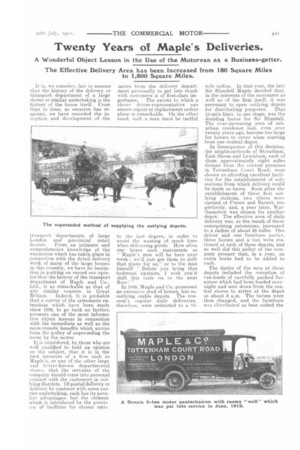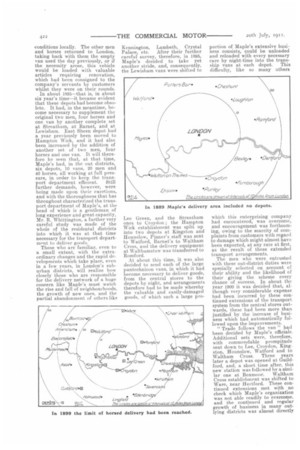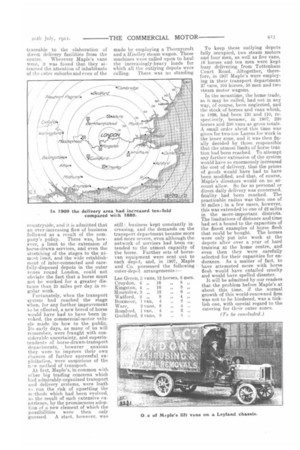Twenty Years of Maple' s Deliveries.
Page 7

Page 8

Page 9

If you've noticed an error in this article please click here to report it so we can fix it.
A Wonderful Object Lesson in the Use of the Motorvan as a Business-getter.
The Effective Delivery Area has been Increased from 180 Square Miles to 1,800 Square Miles.
It. is, we consider, fair to assume that the history of the delivery or transport department of a large stores or similar undertaking is the history of the house itself. From time to time, as occasion has required, we have recorded the inception and development of the transport departments of large London and provincial retail houses. From an intimate and comprehensive knowledge of the expansion which has taken place in connection with the detail delivery work of many of the large houses in this country, we have no hesitation in putting on record our opinion that the history of the transport department of Maple and Co., Ltd., is as remarkable as that of any similar concern in Great Britain. . Indeed, it is probable that a survey of the systematic extensions which have been made since 1889, to go back no farther, presents one of the most informative object lessons in connection with the immediate as well as the more-remote benefits which accrue from the policy of superseding the horse by the motor.
It is considered, by those who are well qualified to hold an opinion on the subject, that it is in the best interests of a firm such as Maple's, or any of the other large and better-known departmental stores, that the servants of the company should come into personal contact with the customers in outlying districts. Of postal delivery or delivery by contract with some carrier undertaking, each has its peculiar advantages, but the element which is introduced by the provision of facilities for chosen emis saries from the delivery department personally to get into touch with customers is of first-class importance. The extent to which a clever driver-representative can secure repair or replacement orders alone is remarkable. On the other hand, such a man must be tactful to the last degree, in order to avoid the wasting of, much time when delivering goods. How often one hears such , statements as " Maple's men will lie here next week ; we'll just get them to shift that piano for us," or to the man himself " Before you bring that bedstead upstairs, I wish you'd shift this suite on to the next floor !." In 1889, Maple and Co. possessed an extensive stud of horses, but no outlying stable depots. The concern's regular daily deliveries, therefore, were restricted to a 15
mile radius. In that year, the late Sir Blundell Maple decided that, in the interests of the customers as well as of the firm itself, it was necessary to open outlying depots for distributing purposes. That 15-mile limit, in one stage, was the deciding factor for Sir Blundell. The ever-increasing area of suburban residence had, even over twenty years ago, become too large for horses to cover when starting from one central depot. In consequence of this decision, the neighbourhoods of Streatham, East Sheen and Lewisham, each of them approximately eight miles distant from the central premises in Tottenham Court Road, were chosen as affording excellent facilities for the establishment of substations from which delivery could be made as bases. Soon after the establishment of these first outlying stations, two others were opened at Pinner and Barnet, respectively, and, a year later, Walthamstow was chosen for another depot. The effective area of daily delivery was, as the result of these enterprising extensions, increased to a radius of about 23 miles. One driver and one furniture porter, three horses and a van were stationed at each of these depots, 'and so well did this policy of the company prosper that, in a year, an extra horse had to be added to each.
The duties of the men at these depots included the reception of van-loads of carefully packed furniture which had been loaded overnight and sent down from the central stores to arrive at the depot at about 9 a.m. The horses were then changed, and the furniture was distributed as best suited the
conditions locally. The other men and horses returned to London, taking back with them the empty van used the day previously, or if the necessity arose, this vehicle would be loaded with valuable articles requiring renovation, which had been consigned to the company's servants by customers whilst they were on their rounds.
In about 1005—that is, in about six year's time—it became evident that these depots had become obsolete. It had, in the meantime, become necessary to supplement the original two men, four horses and one van by another complete set at Streatham, at Barnet, and at Lewisham. East Sheen depot had a year previously been moved to Hampton Wick, and it had also been increased by the addition of another set of two men, four horses and one van. It will therefore be seen that, at that time, Maple's had, in the out districts, six depots, 10 vans, 20 men and 40 horses, all working at full pressure, in order to keep the trans port department efficient. Still further demands, however, were being made upon their exertions, and with the thoroughness that has throughout characterized the transport department of Maple's, at the head of which is a gentleman of long experience and great capacity, Mr. R. Whittington, a further very careful study was made of the whole of the residental districts into which it was at that time necessary for the transport department to deliver goods. Those who are familiar, even to a small extent, with the extraordinary changes and the rapid developments which take place, even in a few years, in London's suburban districts, will realize how closely those who are responsible for the delivery network of a huge concern like Maple's must watch the rise and fall of neighbourhoods, the growth of new ones, and the partial abandonment of others like
Kennington, Lambeth, Crystal
Palace, etc. After their further careful survey, therefore, in 1895, Maple's decided to take yet another stride, and, consequently. the Lewisham vans were shifted to
Lee Green, and the Streatham ones to Croydon; the Hampton Wick establishment was split up into two depots at Kingston and Hounslow, Pinner's staff was sent to Watford, Barnet's to Waltham Cross, and the delivery equipment at Waltha,mstow was transferred to Romford.
At about this time, it was also decided to send each of the large pantechnicon vans, in which it had become necessary to deliver goods, from the central stores to the depots by night, and arrangements therefore had to be made whereby the valuable and easily-damaged goods, of which such a large pro
portion of Maple's extensive business consists, could be unloaded and reloaded with every necessary care by night-time into the transship vans at each depot. This difficulty, like so many others
which this enterprising company had encountered, was overcome, and encouragement was forthcoming, owing to the scarcity of complaints from customers with regard to damage which might almost have been expected, at any rate at first, as the result of these extended transport arrangements. The men who were entrusted with these out-district duties were specially selected on account of their ability and the likelihood of their giving the scheme every chance of success. In about the year 1900 it was decided that, although very considerable expense had been incurred by these continued extensions of the transport system from the central stores outwards, these had been more than justified by the increase of business which had automatically followed upon the improvements. "Trade follows the van " had been decided by Maple's officials. Additional sets were, therefore, with commendable prompitude sent down to Lee, Croydon, Kingston, Hounslow, Watford and to Waltham Cross. Three years later a depot was opened at Guildford, and, a short time after, this new station was followed by a similar one at Boxmoor. Waltham Cross establishment was shifted to Ware, near Hertford. These continued extensions met with no check which Maple's organization was not able readily to overcome, and the continued and regular growth of business in many outlying districts was almost directly
traceable to the elaboration of direct delivery facilities from the centre. Wherever Maple's vans went, it was found that they attracted the attention of inhabitants of the outer suburbs and even of the countryside, and it is admitted that an ever-increasing flow of business followed as a result of the com
pany's policy. There was, however, a limit to the extension of horse-drawn services, and even the stretching of the stages to the utmost limit, and the wide establishment of inter-connected and carefully-disposed depots in the outer zones round London, could not obviate the fact that a horse must not be worked for a greater distance than 25 miles per day in regular work.
Fortunately, when the transport system had reached the stage when, for any further improvement to be effected, a new breed of horse would have had to have been invoked, the commercial-motor vehicle made its bow to the public. Its early days, as many of us will remember, were fraught with considerable uncertainty, and superintendents of horse-drawn-transport departments, however anxious they were to improve their own chances of further successful exploitation, were suspicious of the ri.-w method of transport. At first, Maple's, in common with other big trading concerns which had admirably-organized transport and delivery systems, were loath to run the risk of upsetting the nr,thods which had been evolved, as the result of such extensive expenence, by the promiscuous adoption of a new element of which the possibilities were then only
guessed. A start, however, was made by employing a Thornycroft and a Hindley steam wagon. These machines were called upon to haul the increasingly-heavy loads for which all the outlying depots were calling. There was no standing
still : business kept constantly increasing, and the demands on the transport department became more and more severe, even although the network of services had been extended to the utmost capacity of the horse. Further sets of horsevan equipment were sent out to each depot, and, in 1907, Maple and Co. possessed the following outer-depot arrangements:— To keep these outlying depots fully occupied, two steam motors and four men, as well as five vans, 16 horses and ten men were kept busy delivering from Tottenham Court Road. Altogether, therefore, in 1907 Maple's were employing in their transport department 27 vans, 104 horses, 58 men and two steam motor wagons.
In the meantime, the home trade, as it may be called, had not in any way, of course, been neglected, and the stock of horses and vans which, in 1899, had been 130 and 110, respectively, became, in 1907, 320 horses and 250 vans as gross totals. A small order about this time was given for two-ton Lacres for work in the inner zone, and it was then finally decided by those responsible that the utmost limits of horse trac • tion had been reached. To attempt any further extension of the system would have so enormously increased the cost of delivery, that the prices of goods would have had to have been modified, and that, of course, Maple's directors would on no account allow. So far as personal or direct daily delivery was concerned, finality had been reached. The practicable radius was then one of 30 miles ; in a few cases, however, this was extended to one of 42 miles in the more-important districts. The limitations of distance and time had set a. bound to the capacities of the finest examples of horse flesh that could be bought. The horses were only put into work at the depots after over a year of hard training at the home centre, and even then they were carefully selected for their capacities for endurance. As a matter of fact, to have attempted more with horse flesh would have entailed cruelty and would have spelled disaster.
It will be admitted by our readers that the problem before Maple's at about this time, if the normal growth of this world-renowned firm was not to be hindered, was a ticklish one, with special regard to the catering for their outer zones.




















